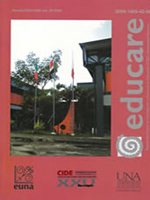Accesibilidad para ingresar a la Educación Superior: desafíos y logros desde el enfoque de la diversidad
DOI:
https://doi.org/10.15359/ree.12-1.5Keywords:
higher education, admission, diversity, disability, adaptations, accessAbstract
Concerning the social role, humanistic mission, professional training and development of knowledge pursued by state universities, this article poses the challenge of valuing the difference and acknowledging diversity as a true commitment to society. From the standpoint of diversity, the article proposes to embrace the population with disabilities from the time of entrance and admission to Universidad Nacional.
References
Asamblea Legislativa de Costa Rica. (1996). Ley 7600 de Igualdad de Oportunidades para las
Personas con Discapacidad. San José, Costa Rica. s.e.
Cedeño, M., Quesada, M.,y Zamora, J. (2001). El rediseño curricular en los planes de estudio.
Aspectos teóricos y guía metodológica. Heredia: EUNA.
Consejo Nacional de Rectores. (2004). Plan Anual de la Comisión Interinstitucional de Accesibilidad
a la Educación Superior. San José, Costa Rica. s.e.
Dengo, M. (2002). Nuevos paradigmas para la educación. San José: EUNED.
Dengo, M. (2005). Desarrollo de las universidades latinoamericanas en el Siglo XX y la Acreditación.
San José: SINAES.
Departamento de Orientación y Psicología (2002). Guía para el estudiante de primer ingreso. Heredia,
Costa Rica: Departamento de Publicaciones UNA.
Giroux, H. (2001). Cultura, política y política educativa. Barcelona: Editorial GRAÓ.
Gordon, M., Keiser, S. (2000). Accommodations in Higher Education under the Americans with
Disabilities Act. New York: The Guilford Press.
Jiménez, R. (2002). Las personas con discapacidad en la educación superior: Una propuesta para
la Diversidad e Igualdad. San José: Fundación Justicia y Género.
Núñez, B. (1974). Hacia la Universidad Necesaria. Heredia: Departamento de Publicaciones
UNA.
Reyes, I. (2003). Equidad y curriculum universitario. Equidad como eje transversal. Documento no
publicado, Dirección de Docencia, Universidad Nacional, Heredia, Costa Rica. (FORO)
Segura, O. (2005). Nuestra Universidad. Recuperado 20 octubre, 2006 de: http://www.una.ac.cr/
nuestrau.htm.
Solís, R. (2002). Diferencia y Universidad. En Jiménez, R. Personas con Discapacidad en la
Educación Superior. San José: Fundación Justicia y Género.
Stupp, R. (2002). Universidades Accesibles para Todos. Personas con discapacidad en la educación
superior. San José: Fundación Justicia y Género.
UNESCO. (1988). Declaración Universal de los Derechos Humanos. París: Organización de las
Naciones Unidas para la Educación, la Ciencia y la Cultura.
Universidad Nacional. (2004). Plan Global Institucional 2004-2011. Heredia: Departamento de
Publicaciones UNA.
Universidad Nacional, Dirección de Docencia Vicerrectoría Académica, Programa de evaluación
y gestión de la calidad académica. Incorporación de los Ejes Transversales en los Planes de
Estudio. Recuperado 20 octubre, 2006 de http://peva@una.ac.cr.
Zúñiga, E. (2002). Las Adecuaciones Curriculares en la Universidad: Un Derecho y una
Responsabilidad Impostergables. Personas con discapacidad en la educación superior. San
José: Fundación Justicia y Género.
Downloads
Published
How to Cite
Issue
Section
License
1. In case the submitted paper is accepted for publication, the author(s) FREELY, COSTLESS, EXCLUSIVELY AND FOR AN INDEFINITE TERM transfer copyrights and patrimonial rights to Universidad Nacional (UNA, Costa Rica). For more details check the Originality Statement and Copyright Transfer Agreement
2. REUTILIZATION RIGHTS: UNA authorizes authors to use, for any purpose (among them selfarchiving or autoarchiving) and to publish in the Internet in any electronic site, the paper´'s final version, both approved and published (post print), as long as it is done with a non commercial purpose, does not generate derivates without previous consentment and recognizes both publisher's name and authorship.
3. The submission and possible publication of the paper in the Educare Electronic Journal is ruled by the Journal’s editorial policies, the institutional rules of Universidad Nacional and the laws of the Republic of Costa Rica. Additionally, any possible difference of opinion or future dispute shall be settled in accordance with the mechanisms of Alternative Dispute Resolution and the Costa Rican Jurisdiction.
4. In all cases, it is understood that the opinions issued are those of the authors and do not necessarily reflect the position and opinion of Educare, CIDE or Universidad Nacional, Costa Rica. It is also understood that, in the exercise of academic freedom, the authors have carried out a rogorous scientific-academic process of research, reflection and argumentation thar lays within the thematic scope of interest of the Journal.
5. The papers published by Educare Electronic Journal use a Creative Commons License:















 The articles published by Educare Electronic Journal can be shared with a Creative Commons License:
The articles published by Educare Electronic Journal can be shared with a Creative Commons License: 



